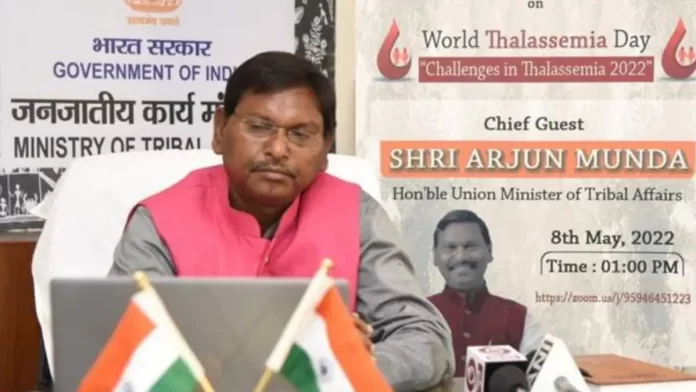On the occasion of World Thalassemia Day which is marked on May 8 every year, Union Minister for Tribal Affairs Arjun Munda virtually addressed a webinar “Challenges in Thalassemia 2022” in New Delhi today.
It was jointly organized by the Ministry of Tribal Affairs along with various ministries and the Thalassemia association. Experts from India and various parts of the world took part in the Conference.
In his address, the Union Minister Arjun Munda said that as we celebrate Azadi Ka Amrit Mahotsav, it is the Prime Minister’s vision that we make new resolutions that will propel India towards AtmaNirbhar Bharat during the period of Amrit Kaal.
In this direction, we should also make new resolutions for tackling the problem of Thalassemia, he said.
Need to have a Nationwide Awareness Campaign
Shri Arjun Munda also said “There is a need to have a nationwide awareness campaign through the stakeholders of various ministries and state governments such as Teachers- students, Anganwadi and ASHA workers, which is essential for mounting an attack on the problem of Thalassemia.
He also said that a teacher should give five minutes extra to create awareness among students and similarly Anganwadi workers should inform the villagers about the disease and its prevention.
Common Literature in Simple and Local Language
Union Minister also suggested that there should be common literature in simple and local language to guide the local level workers and help them in creating awareness.
“Apart from awareness and counseling cheap medicines availability and Community blood donation and in rural areas should be promoted”, the Minister urged.
In his address, Anil Kumar Jha, Secretary, Ministry of Tribal Affairs said that through awareness, effective participation, and the whole government approach India can control, prevent and treat the disease.
He also said that Ministry will provide support to all private and public institutions working in the field of controlling Thalassemia.
This program highlighted important aspects of understanding Thalassemia followed by its education and awareness which also includes screening and management, by the key international experts and other partners like Thalassemia India and Thalassemia and Sickle Cell Society (TSCS) in association with Mumbai Hematology Group.
What is Thalassemia?
Thalassemia is a genetic blood disorder characterized by decreased hemoglobin production. There are two main types, alpha-thalassemia, and beta-thalassemia. The severity of alpha and beta-thalassemia depends on how many of the four genes for alpha globin or two genes for beta-globin are missing.
Thalassemia and sickle cell anemia in India is a huge burden with an estimated 100,000 patients with a β Thalassemia syndrome and around 150,0000 patients with sickle cell disease/trait, but few among them are optimally managed, and allogeneic stem cell transplant (BMT) is unaffordable for the majority of families.
A key aspect to manage Thalassemia is to promote education and awareness, which is a key to success.
Government and non-government organizations have been working towards this goal for the last 3 to 4 decades but a nationwide collaborative effort in regard to the above, reaching all rural regions where almost 70% of the population resides is the need of the hour.
